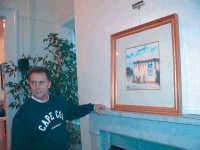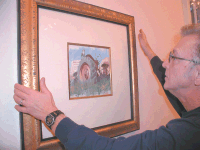| Bedford Gazette - December 2005 | Altoona Mirror - January 2007 |
| By Josh Kowalkowski, Gazette Staff Writer (Bedford Gazette, Bedford Pa) December 3, 2005 Andrew Mahoney, a pastel artist from Pittsburgh, believes everybody has a tractor story to tell. Tractors became a subject of fascination when he was a teenager and sold toy tractors at a farmer's market near Lancaster. The theme at this month's Bedford County
Arts Center show is going to be "The Eye of the Tractor," and
will show why Mahoney believes tractors can reveal so much about
a person by invoking emotions and memories. About 30 pieces of Mahoney's work from the last several years will be on display until Dec. 30. On Sunday, viewers will have the opportunity to meet the artist at a reception from 1-3 p.m. at the Arts Center. The name of the show comes from a biblical reference in the New Testament where Jesus says, "It's easier for a camel to go through the eye of a needle than for a rich man to enter the kingdom of heaven." Mahoney calls the tractor the "modern day camel," and said the tractor symbolizes humility. Many of Mahoney's tractor paintings show a solitary tractor just resting in a landscape. The tractors are colorful and often stand out in the yellow fields where they sit. "The Native American people have four truths, and one of them is
'all there is is the earth and sky,'" he said. Mahoney's interest stems from capturing the relationship between the two and what he calls the "known and the unknown." Mahoney, 44, grew up in Danville, where he was an artistic child prodigy that started drawing when he was 2 years old. Mahoney said when he was 3, his mom and dad couldn't keep up with his constant need for construction paper. To remedy this, they bought him a chalkboard. His parents were instrumental in supporting his habits. Early on, his mom encouraged him to draw outside, and his dad facilitated his drawing at the early age. His dad was a Chemical lab technician, barber and mayor of the town he grew up in, while his mom was a nurse who did paint at one time. Before switching over to pastel painting, Mahoney experimented with watercolor and pen and ink drawings. After deciding to work with pastels, Mahoney did some research on who the most prolific pastel painters of the time were. His studying led him to Albert Handell and Anita West, both of whom he still studies with. Currently, Mahoney lives in Pittsburgh, but he has a part-time home and studio in Bedford, where many of his tractor scenes are painted. He is represented by Tresor Gallery on Ellsworth Street in Pittsburgh. "The tractor makes us reflect on our destiny, and for me, the destiny is the past, present and the future," he said. In addition to Bedford County, Mahoney has developed a fondness for tractor and landscape scenes in the Southwest, particularly the Santa Fe region. He enjoys the plein air work, which is painting outdoors on location, and also working in his studio. Although he developed an interest in tractors at a young age, there was one particular moment in Mahoney's life where he felt a calling to paint them. Before moving to Pittsburgh, Mahoney lived out in the suburbs of Washington, D.C. From his window, he could see a field of old tractors, belonging to an old woman named Virginia, which were gradually being sold off. "And then one man came and took the last one and that inspired my painting, 'Her Last Tractor,'" Mahoney said. "And that started the whole thing." After he started painting tractors, Mahoney said people come up to him all the time sharing their tractor stories with him. "I think tractors are a symbol for a lot of people that represents a lot of times, memories they've had as a youth and what they yearn for," he said. Often, Mahoney said, the stories are emotional and involve fond memories of loved ones. There is also a tendency for people to form associations with the farm vehicle. "People are really afraid the tractor will disappear, and maybe they'll lose the connection with the life they once had," he said. Sometimes when Mahoney tells people that he paints tractors, some have a rather condescending attitude at first. "And then they change," he grinned. "A lot of people have associations with tractors, and they don't even know it." Mahoney laughed and said he has never scene a tractor he didn't like. "I think it's just this innate respect I have with tractors, and my need for it to be paid homage to," he said. Mahoney credits his innate ability as part of the inspiration that motivates him to paint. As a gifted child, Mahoney said it was often difficult for him to paint, given all the pressures he had, both internally and externally. There were pressures he placed on himself as well as pressures from society. "Usually when child prodigies reach adulthood, they cease to perform," Mahoney said, while indicating that he did decide to pursue other gifts at the time. Another talent Mahoney soon discovered was his knack for working with the gifted population. While he was working on this goal, he still occasionally painted when the mood struck him. In 1999, he returned to painting on a more professional basis. While he is often busy painting, Mahoney is also a nationally known counselor who specializes in working with the gifted and talented population. Mahoney travels throughout the country as a public speaker, focusing on topics such as the emotional and social needs of gifted children. Mahoney doesn't partake in juried shows, partly because of the pressures he felt when he was younger. He follows no particular schedule when painting. "I paint all the time. Right now, I'm painting," he simply said. "When I'm called to paint, I paint."
Tom Ringler hanging Mahoney's "Harmony" on Tuesday at the Bedford County Arts center. Mahoney said he spent two years looking for this image and called it the "search for the yellow tractor." Art viewers will have a chance to mingle with Mahoney at a meet-the-artist reception from 1-3 p.m. on Sunday. Mahoney's pastel paintings will be on display until Dec. 30. Mahoney's "Garcia Street," was painted in
Santa Fe. In addition to tractor painting, Mahoney often likes
to paint landscapes after starting to study with well
"Fire in the Sky" was painted when the there were wildfires out in the desert around Santa Fe a couple years ago. Mahoney said the fires accounted for the purple sky as seen in the painting.
|
| TOP |
Andy Mahoney puts talent, experience to good use “I just drew constantly,” said Mahoney, 45. “My father couldn’t keep me in construction paper, so he bought me a chalk board.” But once he reached school age, he ran into problems many gifted children face. “It was more of a challenge dealing with feeling different because I was an artist,” Mahoney said. “I was also using my talent to avoid where I was vulnerable academically, as a lot of gifted people do.” Today, Mahoney, a licensed professional counselor, is one of a handful of therapists in the country to specialize in counseling gifted and talented individuals of all ages. “Giftedness doesn’t go away,” Mahoney said. The Danville native, with offices in Bedford and Pittsburgh, has clients from as far as Alaska and keep in touch through videoconferencing. “It’s a new specialty,” Mahoney said. “I do think it will grow as more people start to figure out that gifted people have needs, and often very complex needs.” The nationally renowned Mahoney holds a master’s in family and marriage counseling and sees clients from all backgrounds. But his focus is on the gifted. “When I first became a counselor, I started off feeling like this was an interesting field, but I didn’t know where it was going to take me,” Mahoney said. “Then it emerged into a whole new discipline. There’s an enormous void for helping the gifted and talented with social, emotional and educational issues.” As the headmaster of the Chicago-based Arts and Sciences Academy for gifted children, Dr. Mary Christensen gets many calls from parents seeking help for their children. “And I just don’t have a list to give them,” said Christensen, who met Mahoney about 15 years ago through the National Association of Gifted Children. Mahoney does periodic consultations at the academy, and Christensen said he develops an instant rapport with clients. “He’s a good mix between being very gentle and saying, no, this behavior is not going to get you where you need to go,” said Christensen, who’s also director of gifted education at Dominican University in Chicago. “Students know he gets it.” A frequent problem Mahoney sees in clients is an undiagnosed learning problem that prohibits them from achieving success. Tests might not detect the problem, “but at the same time, the person has all the signs and symptoms of a learning disability,” Mahoney said. “So you have very bright kids with high-level expectations who aren’t meeting their potential.” Other times, gifted children struggle to fit in with their peers. “Their development tends to be kind of out-of-sync,” he said. A child might be emotionally mature, but lagging behind in motor skills; intellectually brilliant, but unable to get along with classmates. He said in these situations, everyone feels overwhelmed the school, the parents and the gifted child. “Ever since I’ve been in the business, I’ve made a commitment to helping to build the relationship between the family and the school, to help everyone and remove that adversarial relationship,” Mahoney said. Kristen Linfante realized her son, Hale, was gifted early onóhe taught himself to read at age two and skipped kindergarten. When the Linfante family moved to Pittsburgh from Cleveland last year, she sought Mahoney’s help in making Hale’s transition a smooth one. “When we first started looking online, we couldn’t find anything,” Linfante said of her search for a therapist who works with gifted people. “There was literally no one else. [Andy] was like striking gold.” Now seven, Hale is what’s known as “twice exceptional”; he’s gifted and has Attention Deficit Hyperactivity Disorder. “Andy became our guru,” Linfante said. “He’s really the glue that held us together.” Hale struggled with making friends, feeling anxious and being bored in school. Thanks to Mahoney’s mentoring, he’s now thriving in the third grade, Linfante said. But many issues that gifted children face won’t just disappear come adulthood, Mahoney said. A gifted adult who gets promoted at work might suddenly face performance problems because he or she isn’t advanced in all areas. “There’s this idea that just because someone is gifted, they’re able to do it all,” he said. “That’s a myth.” Other gifted individuals neglect their talent once they grow up, some returning to it eventually, others leaving it behind forever. Mahoney gave up art in college and only came back to it eight years ago. “It was the most painful experience I ever went through,” said Mahoney, a landscape pastel artist whose work dots the walls of his East Pitt Street office. “It was emotionally difficult. What was hard to do was allow myself to be so expressive again.” Last fall , he hosted a workshop called Reclaiming Your Genius for adults who abandoned childhood talents. “I think you need to come to terms with all the issues related to why you didn’t pursue it earlier in life,” he said. Friends sometimes try to encourage Mahoney to enter his work in contests or juried arts shows, but he isn’t interested. “That would take me back to where I was as a child,” said Mahoney, whose trademark tractor image surfaces in much of his art. “I don’t want my work to be tied to performances.” Feeling like he needed an escape from D.C. life, he bought his weekend home in Bedford after the Sept. 11 terrorist attacks. “I just fell in love with it,” he said. For Deirdre of northern Virginia, Mahoney is well worth the five-hour round trip to Bedford. Her gifted son, now 15, has been seeing Mahoney for three years. “I absolutely marvel at his abilities,” said Deirdre, who did not want her last name published for privacy reasons. “He empowers the individual in a very healthy way. He’s emphasized self-esteem and self-confidence that’s given my son a better quality of life.” |
|
Copyright 2006. Andrew S. Mahoney. All rights reserved.
|

 Pastel
artist Andrew Mahoney, 44, of Pittsburgh, stands by one of several
tractors he painted in various landscapes across Bedford County that
is on display now at the Bedford County Arts Center. The theme of
the show is taken from this painting entitled, "The Eye of the Tractor." The
scene is from the corner of Findley and Belden roads. Tractors symbolize
humility for Mahoney who says he is attracted to the "sculptured
nature of the tractor as it rests in the field and relates to the
earth and sky." Mahoney has a part-time home and studio in the county.
Pastel
artist Andrew Mahoney, 44, of Pittsburgh, stands by one of several
tractors he painted in various landscapes across Bedford County that
is on display now at the Bedford County Arts Center. The theme of
the show is taken from this painting entitled, "The Eye of the Tractor." The
scene is from the corner of Findley and Belden roads. Tractors symbolize
humility for Mahoney who says he is attracted to the "sculptured
nature of the tractor as it rests in the field and relates to the
earth and sky." Mahoney has a part-time home and studio in the county.  -known pastel artists Albert Handell and Anita West.
-known pastel artists Albert Handell and Anita West.